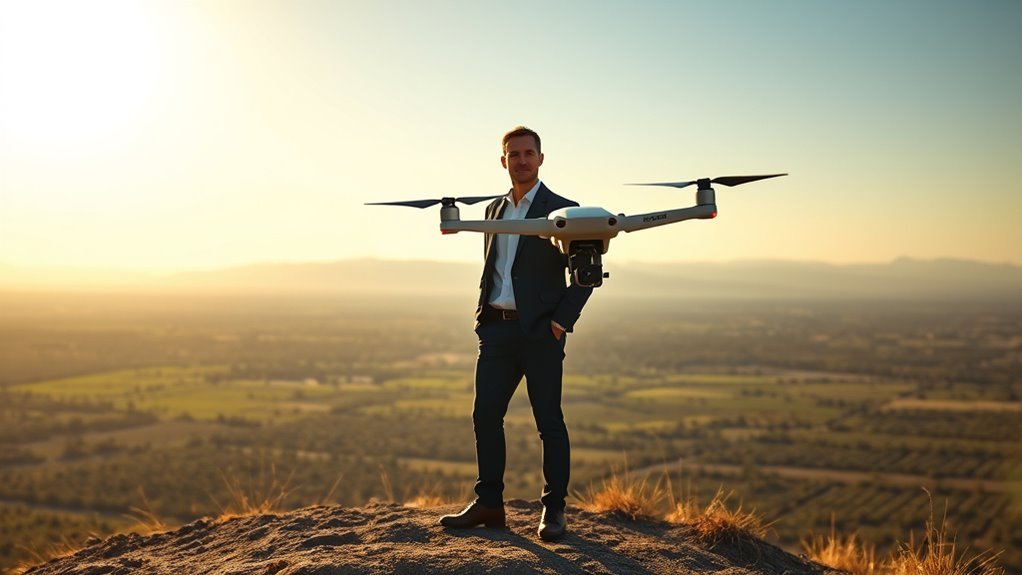As a drone pilot, your earnings can vary considerably based on experience, industry focus, and location. Entry-level positions typically pay between $30,000 and $50,000 annually, while experienced pilots can earn between $60,000 and $100,000. Specialized fields, like cinematography and surveying, generally offer higher salaries. Additionally, urban areas provide better pay due to demand. By understanding these factors, you can better assess your earning potential and career direction as opportunities continue to expand.
Factors Influencing Drone Pilot Salaries

While various factors come into play, the salary of a drone pilot hinges primarily on experience, industry specialization, and geographic location. Certification requirements can greatly impact your earning potential; obtaining an FAA Part 107 license is essential for commercial work, and additional certifications may enhance your credibility. In addition, the costs of equipment also play a vital role in determining your income. High-quality drones and software can demand substantial investment, and these costs may vary widely based on your niche. For instance, cinematography might require advanced gear compared to surveying. Therefore, understanding these elements helps you gauge potential earnings, guiding you towards making informed decisions that align with your professional aspirations and desire for freedom in this dynamic field.
Average Earnings by Experience Level

Drone pilots’ earnings can vary considerably based on their experience level. If you’re just starting out, you might expect entry level salaries ranging from $30,000 to $50,000 annually. These figures often reflect basic operational roles or internships. As you gain experience and refine your skills, your earning potential increases markedly. Experienced pilot earnings can soar between $60,000 and $100,000, particularly if you specialize in high-demand fields like cinematography, surveying, or agriculture. Furthermore, advanced certifications and a robust portfolio can further enhance your value in the market. Ultimately, your commitment to skill development and staying updated with industry trends will play an essential role in maximizing your earnings as a drone pilot.
Salary Variations by Geographic Location

As you consider a career as a drone pilot, it’s essential to recognize that salary variations can greatly depend on geographic location. Urban versus rural environments can markedly impact your earnings, as demand and living costs differ.
- Urban areas often yield higher salaries due to greater demand and competition.
- Rural regions may offer lower pay but can provide a more relaxed lifestyle and less competition.
- International comparisons show that pilots in developed countries typically earn more than those in emerging markets.
Understanding these variations can help you make informed decisions about where to base your career. Whether you seek the hustle of city life or the tranquility of the countryside, your earnings will reflect the environment you choose.
Industry-Specific Earnings for Drone Pilots
Beyond geographic location, the industry you choose to work in can greatly influence your earnings as a drone pilot. For instance, sectors like agriculture and real estate can offer varying pay scales due to their unique commercial applications and regulatory impacts. Here’s a breakdown of average earnings across different industries:
| Industry | Average Earnings |
|---|---|
| Agriculture | $50,000 |
| Real Estate | $60,000 |
| Construction | $70,000 |
| Film and Media | $75,000 |
| Surveying and Mapping | $80,000 |
Choosing an industry aligned with your skills and interests can enhance your financial freedom as a drone pilot while steering through the regulatory landscape effectively.
Future Trends and Opportunities in Drone Piloting
While the drone industry is already booming, the future promises even greater opportunities as technology advances and regulations evolve. As a drone pilot, you can expect to benefit from:
The drone industry’s growth is just beginning; exciting advancements in technology and regulations will unlock new opportunities for pilots.
- Emerging technologies: Enhanced automation and AI integration will improve operational efficiency. Additionally, advancements in drone technology will enable more precise monitoring and data collection in various fields.
- Regulatory changes: New frameworks will likely expand commercial applications and ease restrictions, allowing for broader use cases.
- Diverse industries: Sectors like agriculture, construction, and logistics are increasingly adopting drones, creating high-demand roles.
Additionally, the integration of advanced monitoring systems in agriculture will lead to increased demand for drone pilots skilled in precision agriculture applications. As these trends unfold, staying updated on technological advancements and regulatory shifts will empower you to seize new opportunities and maximize your earnings. Embracing this evolution in the drone landscape can lead to a fulfilling career that offers both freedom and professional growth.
Frequently Asked Questions
What Certifications Are Needed to Become a Drone Pilot?
To become a drone pilot, you’ll need certifications like the FAA Part 107, ensuring you understand drone regulations and flight safety. These credentials empower you to navigate the skies confidently while embracing your freedom.
How Long Does It Take to Become a Certified Drone Pilot?
Becoming a certified drone pilot’s like starting on an adventure. The training duration varies, typically taking a few weeks to several months, depending on your commitment and the certification process you choose. It’s all about dedication!
Are Drone Pilots Considered Freelancers or Full-Time Employees?
Drone pilots often navigate a mix of freelance opportunities and full-time positions. While freelancers enjoy flexibility, full-time roles typically offer employee benefits, balancing freedom and stability. Your choice depends on your career goals and lifestyle preferences.
What Type of Equipment Do Drone Pilots Typically Use?
When you soar high with drone technology, capturing stunning aerial photography, you’ll typically use high-resolution drones equipped with advanced cameras, stabilizers, and software for seamless flight control, ensuring your creative vision takes flight effortlessly.
Can Drone Pilots Work Internationally?
Yes, you can work internationally as a drone pilot, but you’ll need to navigate various international regulations. Embracing global opportunities can enhance your career, provided you stay informed about local laws and compliance requirements.

